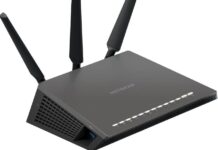Smart homes are gaining popularity for their efficiency and convenience. People who lead busy lives can check on children or pets, raise or lower the thermostat and even close a garage door that they left open, all while away from home. However, these conveniences don’t come without a price. Hackers use advancements in technology to gain access to personal and sensitive information. The good news is that there are several devices you can utilize and safety measures you can take to help prevent your family from becoming the next victim of cybercrime.

Vulnerable Devices in Your Smart Home
You have a hi-tech security camera system and a router for home computer and internet connections. Unfortunately, both of these devices are considered soft targets by hackers and as such, highly vulnerable. The reason is simple; they are, in most cases, unsecured connections. The lack of built-in security makes them a primary target for malware. People who create many of the latest IoT devices don’t have their focus on security, instead, they focus on performance.
Home-Based Business
As a business owner who works from home, you may have dealings with vendors or companies from around the world. Having a secure connection and the ability to monitor things like equipment from virtually anywhere is essential. Thankfully, with recent advancements in technology companies like Soracom can let you experience fast and safe IoT connections through a portable Sim card.
Securing Your Smart Home
A router is the gateway into your home’s internet connections. And, because of this, you should have several safety measures in place to help safeguard your home from a cyber attack. Since the point of entry is your router, and it keeps your electronic devices operational, added additional security is essential. If you currently use a router provided by your local cable company you should upgrade to a more secure model. Once you have it, the first thing you want to do is change the name given to it by the manufacturer to make it more difficult to hack into. It’s in your best interest to refrain from using any names, family pets or birth dates. Second, using WPA2, an encryption method for setting up Wi-Fi networking with help to ensure your communications and network remain secure.
Guest Network
Many people have family and friends who come to visit and in order to accommodate them while there, they often give out their Wi-Fi passcode. The problem with this is that once they have it, your smart home set up is now vulnerable. A great way to avoid this is to keep your account private and let visitors use a separate network that doesn’t connect to your home’s IoT devices.
Disabling Unnecessary Features/ Installing Updates
Most Internet of Things devices come standard with various services that you may not ever use. Instead of leaving them as accessible and exposed, disable them. It’s also important to keep up with updates. If you receive messages about updating the software on your electronic device and you postpone it you’re doing more harm than good. While it may be an inconvenience, losing the ability to use your computer for an hour or so, in many cases, the purpose of the update is regarding increasing your security.
Double Measures to Secure Network Access
Hackers often go after soft targets, such as homes or small businesses because they don’t have the level of security in place as big businesses. A way to provide an added layer of security to your smart home is to add a multi-factor authentication or MFA. This will require a code entered in addition to the typical user name and password.
Be Wary of Vulnerable Connections
Sometimes you may forget about security altogether and this can leave you susceptible to an attack. For example, you meet a friend for lunch at the local diner and while waiting for them to arrive, you open your mobile device to check messages. The problem is that you now have internet access through the diner’s Wi-Fi, which is open to the public. In these types of cases when you are away from home using a VPN or Virtual Private Network lets you access the web in private.
Keeping your personal or business information private is important to you. Luckily, advancements in technology enable you to improve on existing safety measures.

































